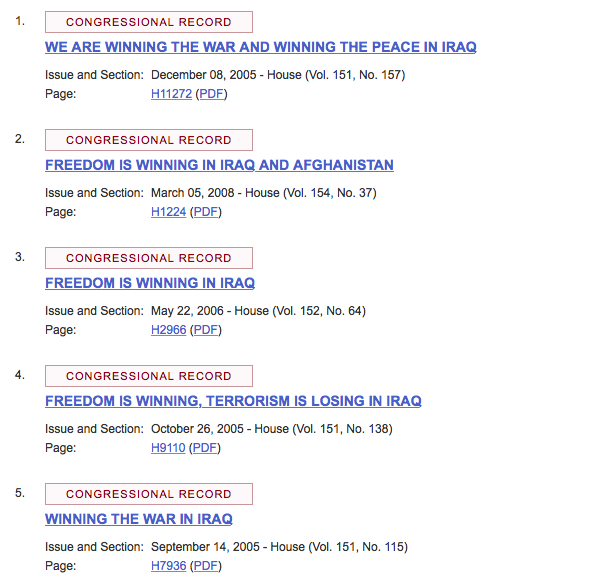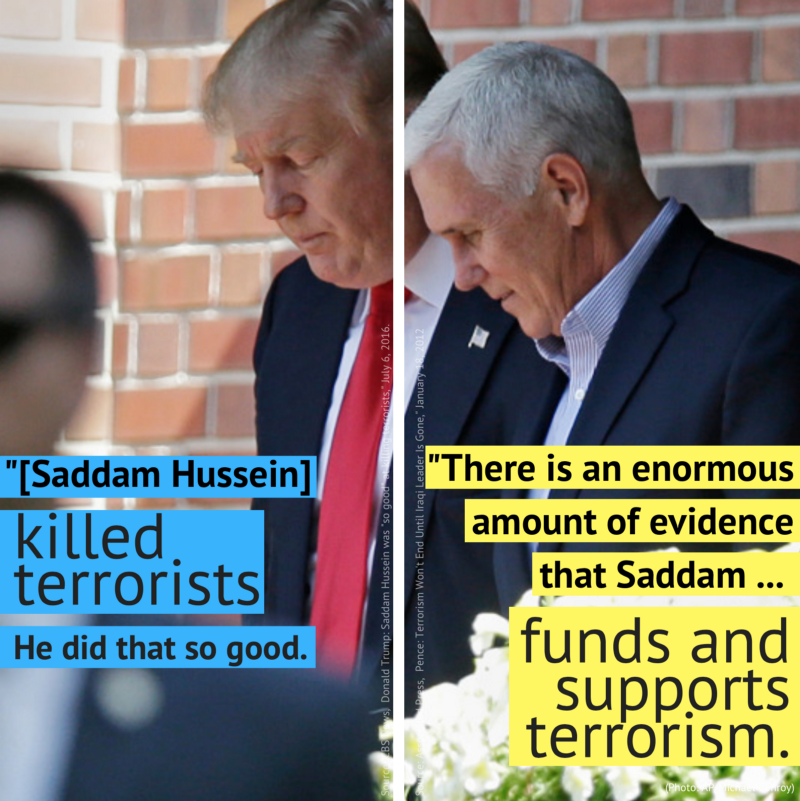Selecting a Vice President is any Presidential candidate’s first national security decision. It is an even more consequential moment for Donald Trump because he has no governing or national security experience and his foreign policy proposals are reckless and impulsive. Despite his 11 years in the House of Representatives, Mike Pence has no foreign policy accomplishments of his own and his largest contribution to the national security debate was the dozens of floor statements falsely declaring victory in the Iraq War. Trump’s Vice-Presidential picks only reinforce his weaknesses on national security.
A Vice President needs to be capable and qualified to be Commander in Chief on a moment’s notice, serves as a key national security advisor, and frequently represents the United States abroad. As former Assistant Secretary of Defense Derek Chollet said, “the Vice President is the most consequential decision a Presidential candidate will make. The Vice President is the President’s most important adviser. He will be at the President’s side when questions of war and peace are on the table.”
Pence was House Republicans’ “Baghdad Bob”
 The titles of some of Pence’s floor speeches praising the Iraq war.
The titles of some of Pence’s floor speeches praising the Iraq war.
Pence voted for the 2002 Iraq War authorization, backed legislation that described Iraq as the “central front in the war on terrorism,” and consistently voted against any legislative effort to alter the disastrous strategy of the Bush administration throughout that conflict. But it was as the top Congressional spokesperson for the war where Pence made his biggest mark, going to the floor of the House of Representatives to deliver speeches in praise of the war and declaring victory 15 times.
“As we go into this weekend, let the word go forth from here: we are winning the war and winning the peace in Iraq.” (Mike Pence, December 8, 2005)
In 2005, Pence went to the floor to declare “Freedom is Winning” despite 2,000 American casualties and a burgeoning sectarian conflict in Iraq that was descending into chaos. Later that same year, he again said “we are winning the war.” He made a variation of that same speech 56 times on the House floor from 2003 to 2008 regardless of the situation on the ground in Iraq during that period. He even had his own “Mission Accomplished” moment in 2007 on the fourth anniversary of President Bush’s Mission Accomplished speech. Pence was the House Republicans’ “Baghdad Bob,” insisting that we were winning when Iraq was disintegrating into horrific violence.
“The war in Iraq was just, is just, and the freedom of the teeming millions who established a constitutional republic 1 week ago supports that conclusion.” (Mike Pence, November 03, 2005)
Trump and Pence Disagree But Are Both Wrong on Saddam and Terrorism

Even more awkward for Trump given his recent praise of Saddam’s toughness on terrorism, Pence consistently argued that Saddam was a supporter of terrorist groups, a terrorist himself, and that the rational for invading Iraq was that it was the next step in the war on terrorism. Pence argued before the war began that there was “a connection between Iraq and al Qaeda,” and that “the next logical step in the war on terrorism is to confront Saddam Hussein once and for all.”
The supposed Iraq-al Qaeda link was a key part of the case for invading Iraq and we now know it was as flawed as the claims made about Saddam’s WMDs. But that’s not to say that Trump is right and Saddam was tough on terrorists; Saddam gave sanctuary to terrorist groups that killed Americans and paid $35 million to the families of suicide bombers who killed nearly 500 people. Remarkably, Trump and Pence are on opposite sides of whether Saddam Hussein was a supporter of terrorism but they are still both wrong.
Despite nearly a decade of the House Foreign Affairs Committee, Pence left no other meaningful legacy on foreign policy. He sponsored no foreign policy legislation that became law. He was not a key player in any other major foreign policy debate. Pence was largely anonymous outside of his wildly inaccurate views on Iraq. Trump’s first national security decision shows that he prioritizes rhetoric over substance and has no real plan to keep Americans safe.